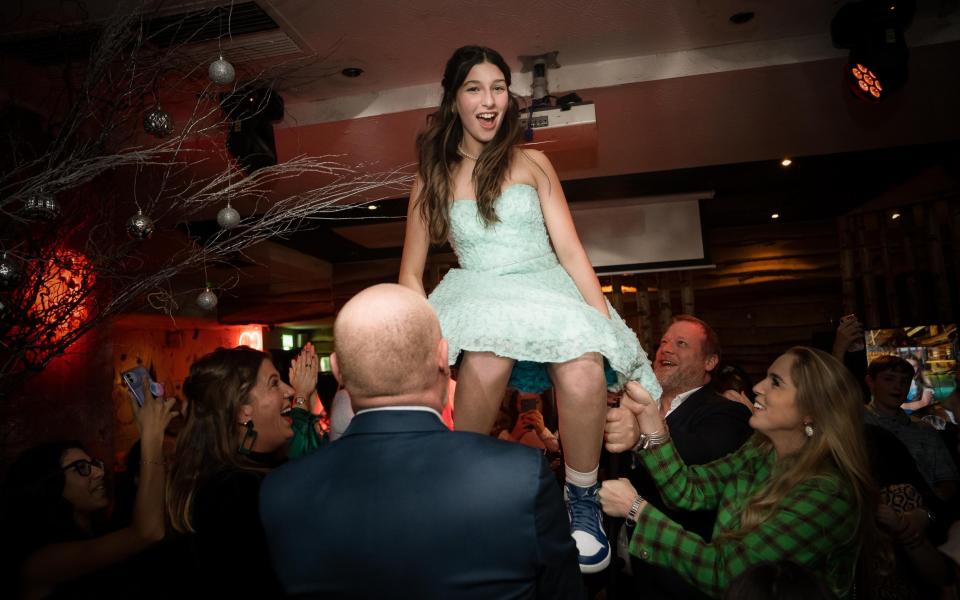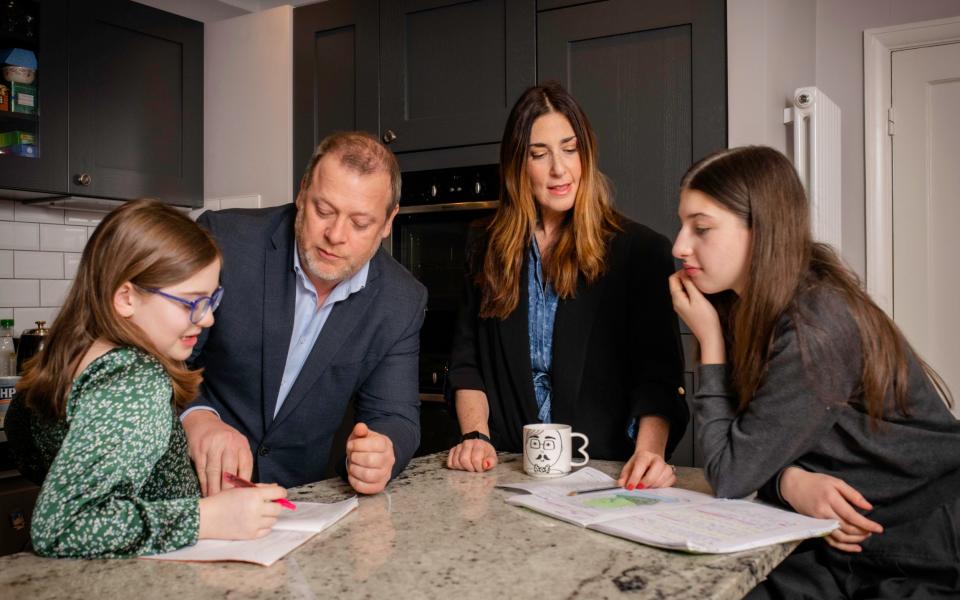‘I married into the Jewish community – there are certain doors I can't follow my children through’

My daughter Clementine finished her bat mitzvah speech with a typically strident flourish. “Without strong Jewish women,” she said, “there is no community.” The rabbi then confirmed her Hebrew name – Leah Zahavah – part-family tradition, part-nod to the glowing connotations of her given name (it means “golden”).
From all sides of the synagogue, or shul, men I did not know approached me with outstretched hands to say “Mazel tov!” Clapping and singing began unprompted. Women showered the podium with sweets, taking aim at the back of their husbands’ heads. Everyone knew what was expected of them – except me. Yet there I was, last month, standing somewhat awkwardly amid the pride and celebration.
I grew up with Jewish friends, had Jewish girlfriends, eventually married a Jewish woman and had two Jewish daughters. But I am an interloper. I’m not Jewish and never wanted to be. After the service, as the old men tucked into the food at the kiddish, I was again compelled to ask, who the hell am I and how did I end up here?
“Do you think you understand what being Jewish means?” said friends Gavin and Haylee over dinner, somewhat mischievously. I shook my head. Knowing my history they thought I might have a special insight rarely afforded outsiders, as if I were a gentile Mowgli. “I understand nothing,” I said. “I know no more about being Jewish now than I did when I was 10.” Judaism has an essence that eludes even the most diligent observers. This presents conundrums when you are the only non-Jew in the house.

My daughter’s confirmation was the latest episode of a life spent looking through the window from outside. That began for me as early as primary school in the 1980s, on the tundra of north-east London and Essex, those unprepossessing suburban flatlands of post-war housing to which London’s immigrant communities moved in their second and third generations. There were so many Jewish children at my secondary school that there had to be a “Jewish assembly”. It drew a bumper crowd, in part because non-Jews realised sitting at the back of a sports hall doing nothing while a rabbi played the violin was preferable to singing Kumbaya.
Sense of identity
As a child there was nothing that equipped me with a sense of identity. The opposite was obviously true of my Jewish friends and their families. They knew who they were. They were Jewish. The differences extended far beyond my friends not being available on Friday nights, or being offered chopped liver or attending a year’s worth of bar mitzvahs. The manic intensity of Jewish home life was an irresistible counterpoint to the quiet brooding that had become my default state.
I never had a moment’s inclination to convert (I did once mention it in passing when a girlfriend dumped me, but it was as feeble an offer as it sounds). I am a tourist in Judaism. But then I’m a tourist wherever I go. As I once coolly observed my friends being excused from school on Jewish holidays, now I observe my friends and family honouring my daughter in a synagogue. Perhaps that’s one of the reasons so many Jewish people have tolerated me over the years. I must have seemed like a stray dog at times.
Fifteen years after leaving home I met Claudine, who I had known as a teenager. We were married and I found myself living with a Jewish woman with whom I had two daughters who, by dint of the Jewish law of maternal primacy, were also unequivocally Jewish.
Our family is a Jewish family, regardless of who I am (or am not). Add a mother and father-in-law, siblings and cousins and I find myself in a family where an argument is not really an argument at all, rather a range of views expressed at greater volume than normal. It is also a secular family. On the “Do you believe in God?” question our household currently has one unconvincing yes, one no, one maybe and one who refuses to discuss it (me). Only a few of my Jewish friends are religious but not one would ever disavow their heritage or the particular mix of ethnicity and culture that makes them Jewish.
Instinctive defiance
I’ve noticed a common reaction to the creep of antisemitism is an instinctive defiance, so that I find people feel “more” Jewish the more they sense the all-too familiar looks in the street or words muttered under someone’s breath – let alone the betrayal of sections of the political Left or an actual attack on a synagogue. When Clementine was mocked in her new school for having a big nose it set alarm bells ringing. Of course, even how I relate to antisemitism is bound up with my peripheral status. I can only experience it vicariously, a witness to the pain of others.
My younger daughter Penelope says I’m a loser for not being Jewish, rather too assuredly for an eight-year-old. Perhaps the greatest giveaway is that I really don’t like chicken soup, an act of treachery for Claudine, tantamount to denouncing the state of Israel. “You know more about Judaism than I do,” she says, somehow making it sound more like an insult than a compliment.
Although my inability to pronounce Yiddish words is another source of spousal derision, I suspect Claudine is secretly pleased I can’t master the back-of-the-throat scrape Jews learn from birth. Perhaps she just likes to make fun of me as much as Penelope does. It wouldn’t do to try too hard to fit in. I don’t want to anyway. Being the outsider can be a bit frosty, but it allows me the kind of existential flexibility I’m comfortable with.

Clementine’s bat mitzvah was as moving as we had anticipated. For the past year or so she had been attending classes in preparation, adamant that she felt Jewish and wanted to announce her commitment.
The generosity shown to me by the rabbi and his congregants is not necessarily universal. I’m not sure I would have been made to feel so welcome in every Jewish community – or by all the in-laws. I’d helped provide the community with two Jewish girls, so I couldn’t be that bad.
Perfect juxtaposition
In Shul, the men, separated at the front, performed three hours of prayers and readings in Hebrew in intoxicating songs of dedication and lament. There is a nobility to a synagogue that is enhanced by gossip and occasional snoring, where the familiar meets the devotional. The formal and the informal are juxtaposed perfectly.
Gavin was there to read a blessing on my behalf and assist the rabbi’s reading of the Torah. It’s what the father is supposed to do. He said he was honoured but the honour was mine. It was a gesture that encapsulated the warmth and goodwill I had felt for over 40 years. Afterwards he explained how he had also said the Kaddish prayer for his dead father, an act of communal memory that is such a distinctive characteristic of the faith. It was one of those moments when my admiration mixed with envy. I can talk tough about the benefits of the floating world, but in the end ritual is irresistible.
After the community news (pretty much who was ill and who was dead), the rabbi discussed two more words I can’t pronounce. “For Clementine’s family,” he said, “naches is not merely pride in your child’s achievements, but a particular pride in having a good Jewish child.” I knew I was proud of her. But if my pride stemmed from my own experience of being her dad, it could never be true naches could it? I suppose I was always looking for signs that I didn’t belong.
The second word was beshert. Claudine is a wedding photographer and says rabbis always talk about beshert, or destiny. It’s comforting to think some things are just meant to be, especially at a wedding. Listening to Clementine speak with such confidence and sincerity, why would I believe otherwise? However I judge my intimacy with or distance from the people in the synagogue, this life has brought me true friendship and a loving family. I’m happy to accept beshert as the cause of my good fortune.
I watched my daughter go somewhere I could not follow. She belonged. It’s made no difference to our relationship. She is still moody and I’m still grumpy. Lord knows what Penelope will be into in a couple of years.
I feel the same way about my Jewish family today as I did about the surrogate families that fed me bagels and chocolate babka three decades ago: honoured, grateful and slightly exhausted. I’m content to be an outsider, but there is one thing about the role of Jewish people in my life that isn’t vicarious: the love. That is definitely real.

 Yahoo Movies
Yahoo Movies 
